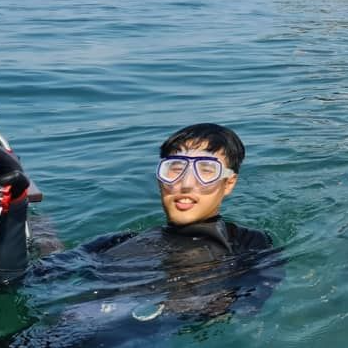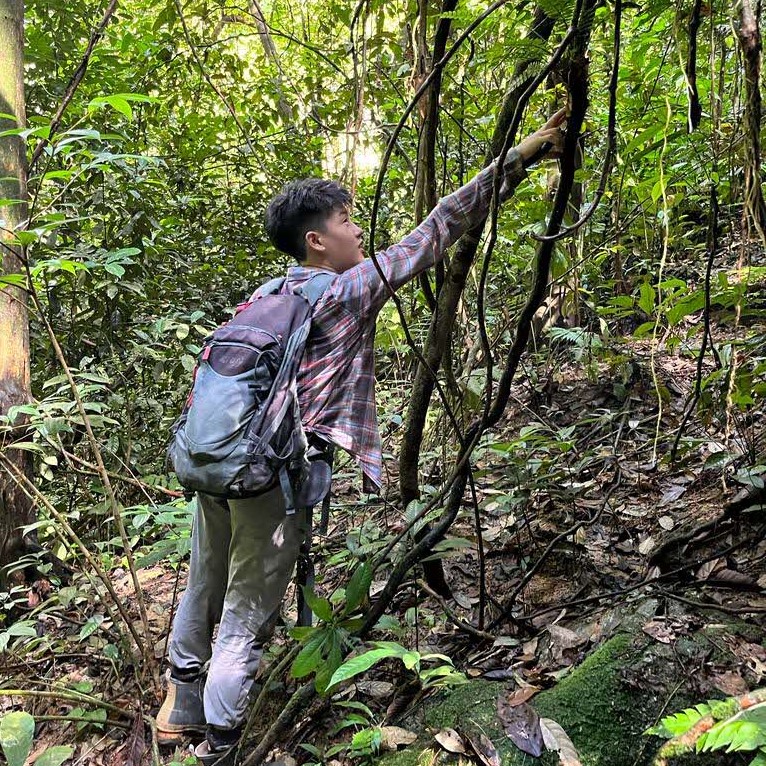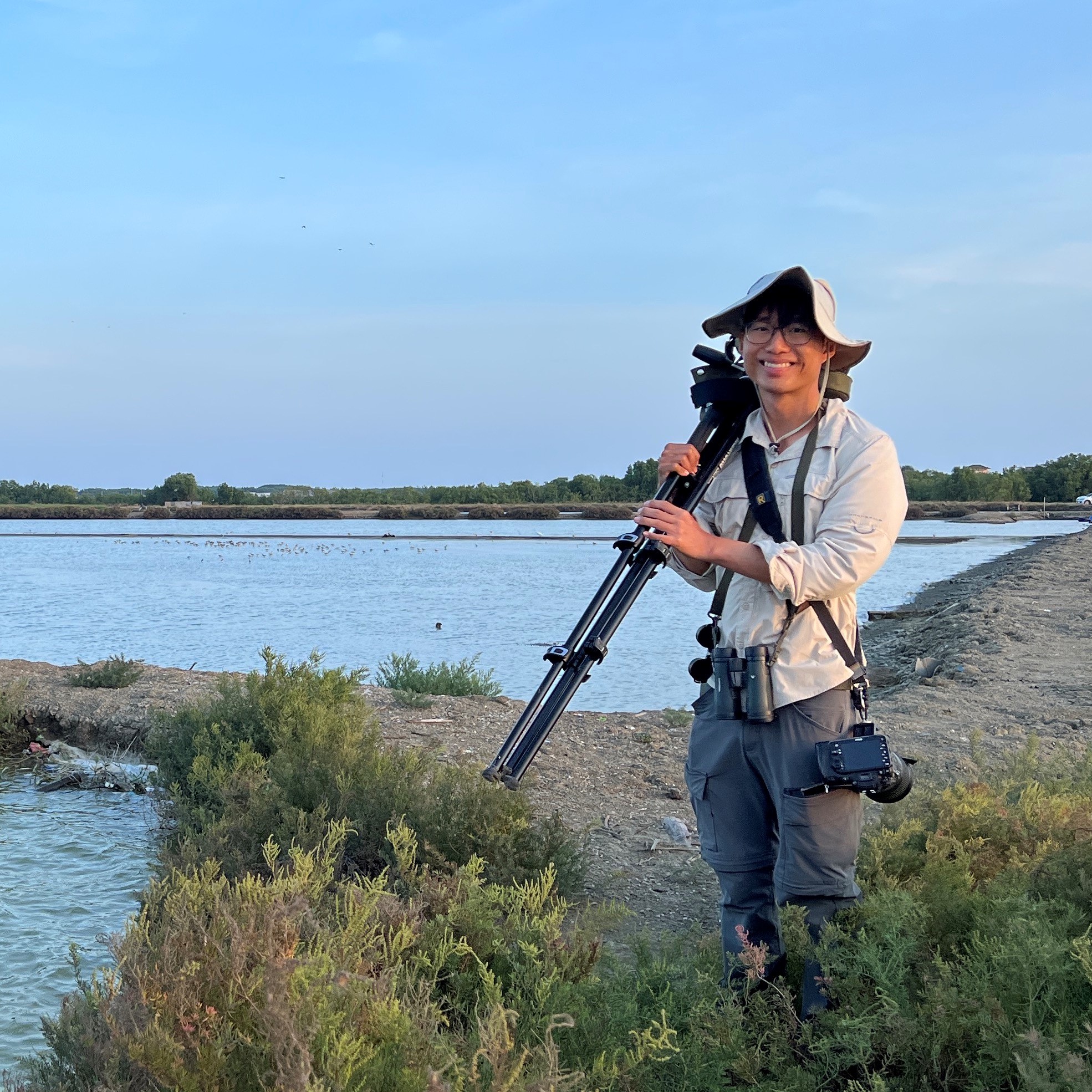Alumni Spotlight : Bridging Nature with the Community
NUS High Alumni in NParks
NUS High may only share two letters with NParks, but we certainly have more than two alumni in there! In fact, out of the 7 employees we found, we managed to snag an interview with 4 of them. Meet Dayna Cheah (Class of 2017), Jonathan Tan (Class of 2013), Yeoh Yi Shuen (Class of 2014) and Dillen Ng (Class of 2012).

|

|

|

|
|---|---|---|---|
| Dayna | Jonathan | Yi Shuen | Dillen |
All of them have their individual stories regarding conservation and the environment.
Dayna started off by conducting outreach activities at the Singapore Zoo and subsequently with various nature groups such as Naked Hermit Crabs. Introducing people to the wonders of nature and wildlife was extremely meaningful to her. As part of the International Year of the Reef in 2018, she planned and implemented a series of monthly marine-themed workshops with other team members, and this is an experience that she holds close to her heart to this day.
Jonathan too, has ties to thalassic matters. At a young age, he would dream of being a marine biologist because he loves all things related to the intertidal zone. He shared that the ecosystem is special to him, highlighting how it only reveals when the tide peels back. However, Intertidal habitats in Singapore are threatened by habitat loss. Many people are also not aware that Singapore is a coastal country, with such beautiful habitats. This is why he posts photos of nature and brings people on intertidal walks in hopes of helping people restore their connection with the seas around Singapore and its animals.
Sporty Yi Shuen, who climbs, wanted to be a firefighter at first to save lives. She was then inspired by branching architecture and green buildings, she has also considered being an architect. Now, she takes care of plants as a hobby and in her job. Interestingly, our local plant person started off as an animal lover, specifically turtles!
Dillen’s favourite quote is “When the last tree has been cut down, the last fish caught, the last river poisoned, only then will we realise that one cannot eat money.” Around half a decade ago when Dillen graduated from university, he wanted to pursue a career related to environmental issues, but found the options limited. He considered professorship but grew up to realise that his interest was not in academia. Today, his career involves conserving nature and biodiversity in Singapore, and sees him conducting wildlife surveys across the island and studying the ecology of birds.
All of our interviewees have interests in plants and animals - ranging from snakes to birds, turtles, and animal diversity in general (guess who likes which!). Their favourite things about nature include the serene recharge it offers, to its sheer diversity, beauty, and healing power. Anyone can access nature to witness the infinite explainable or mysterious variations among living things. Why do snails that spend their entire lives buried have colourful and intricate patterns? What fungi or plants can be used in architecture or bioremediation? There is always something new to find out and see!
With our alumni’s range of experiences and interests, you may be curious: What did they do in high school?
Ecology, Research, and Humanities at NUS High
As biology majors, the ecology and marine biology modules’ field trips gave them key exposure to the subject, whether it was to St John’s Island, Pulau Semakau, Christmas Island, or Pulau Tioman. Nothing can replace the experience of seeing an intertidal zone or the red crab migration up close. Their Biology teachers’ passion rubbed off on them, while the advanced curriculum covered content in their freshman studies. The Year 5 syllabus taught concepts such as edge effects and habitat fragmentation which Jonathan uses in his current job.
Dillen added that his advanced research project prepared him for his university honours thesis. Dayna too, told us about her research project where she studied the effect of aquaculture effluent on the growth of giant clams and corals. Designing the experiment had been a great challenge for her, and she is grateful for the guidance from her mentor Dr Neo Mei Lin. Jonathan chose the topic of fishing in Bukit Brown Cemetery in 2012 amidst the cemetery conservation discourse, reminding us that conservation can come from both environmental and heritage angles.
Our featured alumni also had an interest in the humanities. Dillen majored in History, while Jonathan and Yi Shuen majored in Economics. In addition to naming the entire Biology department, our alumni told us of their favourite English teachers, who influenced their worldviews and intellectual expressions, and hence left a strong impression on them as they transitioned to adulthood in society.
Scholarships and Post-NUS High Studies
What did they pursue after graduating from NUS High? Yi Shuen studied Biology at the University of
Oxford, Dayna studied Natural Sciences at the University of Cambridge, Jonathan studied Ecology at Imperial College London, and Dillen studied Environmental Studies at the National University of Singapore.
Following their studies, they went on to get their jobs, some under the NParks and MND EDGE scholarships. Dayna found alignment with NParks’ work while volunteering with them and wanted to contribute towards conserving Singapore’s environment. Jonathan saw it as a chance to help shape policymaking that would conserve and restore biodiversity. NParks were a natural option for Yi Shuen, who loves working with plants. Dillen went on to pursue his interest in birds, something he discovered in university.
Job Roles at NParks
At the time of our interview (Feb 2022), Dayna is a manager in the Park Planning division while Dillen works at the National Biodiversity Centre (NBC) as a manager in the Terrestrial branch. Yi Shuen and Jonathan were managers at the Native Plant Centre and NBC’s Coastal and Marine branches respectively. (Fun fact: Yi Shuen is at the NBC Terrestrial Branch now, while Jonathan is currently a manager under the Conservation Division!) These are their titles, but what do they do?
As a manager at park planning, one key aspect of Dayna’s job is to safeguard land for parks and park connectors. This involves working closely with other agencies to review land-use plans and ensure that there is an adequate provision of green spaces in Singapore to safeguard our local ecosystems.
Yi Shuen’s job involves conducting ground surveys to look out for the presence of rare or endangered plants, and sometimes research collaborations with colleagues and partners.
When on-site, Jonathan helps out with turtle conservation: relocating sea turtles, releasing turtles and tagging adult turtles. He also does research work and outreach talks. Meanwhile, Dillen watches birds and joins related research projects at other branches for the experience. Some research projects (e.g. the Southern Islands Biodiversity Survey) may require collaboration across branches. A key part of their work involves managing consultations by other agencies on the environmental impact of developments on how to mitigate them. Between themselves and their colleagues, they handle a wide variety of environmental concerns regarding water quality, coral reefs, mangroves, seagrasses,
forests etc. Each person’s area of specialisation might depend on their personal interests, university studies, fieldwork that they have done, or a knowledge gap in the area.
Some commonalities across their jobs are negotiations with multiple stakeholders, evaluations, and doing recce or data collection. Due to the work-from-home system, there is less field time and slower meetings. As they head into the office more after the pandemic, they are happy to return to having face-to-face social interactions, especially at Botanic Garden’s office building, though they do miss the waking up later and spending more time with loved ones”.
As an intern, Jonathan was formerly involved in Bukit Timah Nature Reserve’s operations, where he would look out for visitors’ safety and their interactions with the flora and fauna, and assist with research on-site. In comparison, our alumni’s current roles are geared towards policy-making and programme planning. Yi Shuen adds that operations work involves liaising with public feedback and issues. Preparation is essential for them to resolve situations immediately, and the team works together regardless of their roles.
NParks has a few branches that focus on research, at the Centre for Urban Greenery and Ecology (CUGE), the Singapore Botanic Gardens Herbarium, and the Wildlife Management Research branch where former NUS High teacher Dr Malcolm Soh currently works. Other departments in NParks spearhead conservation for our green spaces and wildlife rehabilitation.
Skill Sets in Environmental Policymaking
What skills do our alumni get to hone in their jobs? In negotiations, it is useful for one to empathise with the reasoning behind other parties’ points of view. Expressing this understanding helps to build trust in the resulting solution. Few people know that behind the scenes of HDB blocks’ building lie these crucial consultations and Environmental Impact Assessments (EIA), which seeks to strike a balance between urban development and nature conservation.
Over at NBC, staff need to be proficient in the science of the work to be technical experts, assess the impact and make mitigation recommendations. They need to understand animal locomotion, basic ecology, habitats and ecosystems, then apply their knowledge to various environments around Singapore.
To assess the environmental value of the site, they look at the species present, how the habitat connects to other habitats and other environmental factors such as water quality and pollution. Since 2020, the Urban Redevelopment Authority’s website has been hosting links to EIAs by public agency developers for the public to read.
In summarising and evaluating reports from consultants, our interviewees need to investigate for possibly overlooked factors and be up to date with the best methods and equipment for surveying biodiversity. They learn along the job to see the bigger picture of developments and the context for masterplans.
Curiosity and broad-based thinking are important too, because they learn on the job topics ranging from urban planning to coastal protection issues regarding climate change. Jonathan brought up that his side interest in history was useful in his conservation planning because understanding the land-use history allows him to better understand the ecosystem and soil conditions. Taking clues from historical maps, one can infer the habitats that can thrive in the area. He notes that the NParks scholarship accepts history as a course of study. Even his current research on habitat mapping involves more geography than biology knowledge.
These are some skills specific to their current jobs. So, what other roles are there?
Roles in the Environmental Sector
Working at NParks is both challenging and rewarding. With the support from passionate teachers and seniors from the Biology Interest Group who are currently in NParks, Dayna received sufficient exposure and opportunities to see what the NParks experience entails and selected it as her career choice.
Dayna shares that her inspiration for joining NParks came from the passionate staff who were driven to make a positive change in the environment. A caveat though, passion-driven careers are not for everyone, as some may tip the work-life balance when they devote themselves to their job. Jonathan heard a saying from a senior colleague that they never leave their job because they work on weekdays and go to parks for leisure or volunteer on weekends.
Some environmental enthusiasts may consider volunteering or working externally. Volunteers choose their activity of interest and execute the programme or survey as planned by the staff, hence handling fewer administrative and logistics matters. Dayna finds volunteering and working equally fulfilling.
Dillen points out that volunteers are involved in surveys and citizen projects, while consultants facilitate the process. Jonathan describes consulting firms as technical experts - an equally important role, but of a different nature. Both agreed that working in the government allows them to see such projects through a broader and different perspective. There are also educational companies and commercial guides in the sector.
In their previous roles, Yi Shuen was a research assistant at an NUS lab and a Conservation Horticulturist at the Native Plant Centre, while Dayna interned at the Coastal & Marine Branch of NBC and Sungei Buloh Wetland Reserve. In the lab, Yi Shuen would look at records of plants in Singapore, consult experts and read literature to analyse their data. The Conservation Horticulturist’s role was to rescue rare or endangered plants from development sites that would be cleared of vegetation, bring them back to the nursery, and then pass them to colleagues to plant them in nature reserves through species recovery programmes.
Our sample size of 4 alumni tells us that they are happy with the work that they do. Their job satisfaction comes from the interdisciplinary nature of their work, helpful and ardent teammates, loads of learning on the job and being able to effect meaningful changes from behind-the-scenes. From conservation efforts to creating accessible spaces for the public to enjoy, they can see themselves contributing towards making the world a better place for others using their knowledge.
Some work that they may be keen to explore next include their next job rotation, working in the private environmental sector, and working with parks in other countries where the infrastructure may be less supportive of nature than Singapore.
Jonathan and Dayna are in the Herpetological Society Singapore ( https://herpsocsg.com/ ), which was co-founded by Sankar (Class of 2012, featured in the first @nush_explorer post). The society does research and outreach on herptiles (think of lizards and frogs).
These are just a fraction of the roles in the environmental sector, where everyone works together for a common cause.
Challenges and Future Outlook
Singapore’s limited space brings about the challenge of protecting its biodiversity while continuing further development such as building new infrastructure and houses. In a society that values economic and progressive growth, it is difficult to weigh the monetary value of these places of nature. Furthermore, the rare species we try to protect do not have a voice, unlike citizens who demand more housing and roads. Thus, environmental issues are often treated as less important.
To this, Jonathan quotes the science-fiction novel Dune by Frank Herbert, “Ecology is the understanding of consequences”. Due to its complexity, things that seem insignificant can have major cascading effects throughout the entire ecosystem. In fact, he has met people studying ecology just because of the maths involved! He sees a fundamental problem with the economic model - constant economic growth is intrinsically unsustainable. Instead, he and Dillen believe that we should prioritise taking care of the environment, rather than letting it be compromised by society and the economy.
Yi Shuen points out that the public may find working in the natural environment undesirable, seeing it as hot, uncomfortable and possibly dirty work. However, exposing them to nature and green spaces and the benefits it brings from young, may reduce this. Dayna adds that having some exposure to biodiversity in school is a good opportunity to build people’s comfort level with nature from a young.
This could be in the form of planting native plants that attract birds and insects or giving guided walks around schools.
Despite these challenges, there is still hope for the future. The pandemic has made people more aware of our local green spaces, and Dayna hopes that this trend stays. She notes that public interest has been shifting towards less manicured urban green spaces. However, Jonathan shares that eventually, the integration of nature into urban spaces will bring about human-wildlife conflict. It helps to understand the underlying reasons and behavioural changes needed for humans to coexist with wildlife in harmony and kindness. People appreciate nature in different ways, and Dayna thinks we could coexist respectfully with nature while being curious observers.
Yi Shuen chimes in that it takes more effort to educate people than to design the infrastructure. She also mentions citizen science programmes such as contributing data from community birdwatching, and encourages people to sign up for tree planting events. These community initiatives involve their participants in thinking about environmental factors such as safety, future developments, and habitat suitability. Dillen agrees that giving the public a stake would make them feel personally invested in and responsible for the environment.
“Everyone values nature,” says Jonathan, going on to explain that it is just to different extents. Sometimes, public support towards a particular species helps to convince stakeholders about the value of protecting its habitat.
Advice for Juniors
The eco-warriors wrapped up the interview by imparting some of their knowledge, in hopes that juniors may benefit. Dillen reflected on his journey thus far and shared that he regrets not starting bird watching earlier. He says that “Expertise, knowledge and hobbies take time. Start earlier, build up your knowledge and capacity, then see how to be involved deeper in different projects down the road.”
Dayna agrees on appreciating the time that one has and encourages juniors to “keep being curious and working to be better than who you were. Make progress, even if it’s slow.”
Dayna agrees on appreciating the time that one has, and encourages juniors to “keep being curious and working to be better than who you were. Make progress, even if it’s slow.”
Jonathan’s tip is to not narrow down on your hobbies. Side interests may provide useful considerations or additional context relevant to your current work or future roles. His own side interests include reading, history, nature photography (his unofficial outreach), and gaming.
Yi Shuen says that having broad knowledge would help one think from other people’s perspectives. Also, it is never too early to reach out to people working in your fields of interest, to get a peek at the insider’s perspective.
NUS High students may email the alumni relations office at nhsalumni@highsch.nus.edu.sg if they would like to contact any alumni featured in this article.
Writer: Leticia Tok (Class of 2021)
Notetaker: Lee Kia En (Class of 2021)
Editors: Dee Pei Fang (Class of 2014) and V Narthananilaa

